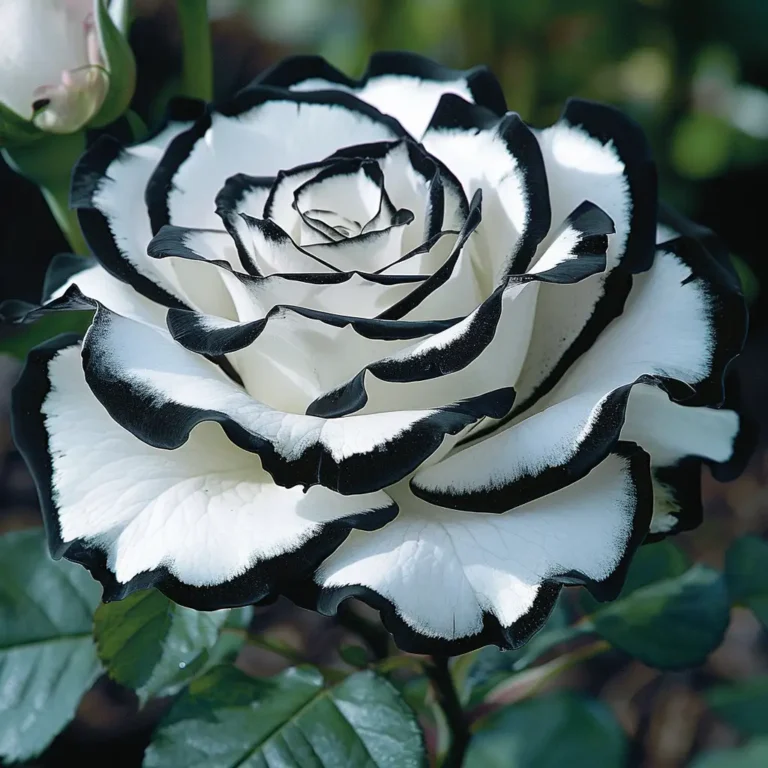Introduction to Ebony and Ivory Rose
The Ebony and Ivory Rose is a unique and striking variety that captivates gardeners and flower enthusiasts alike. These roses, known for their contrasting colors and elegant appearance, are a beautiful addition to any garden. Their distinctiveness lies in their striking black and white hues, making them a symbol of harmony and balance.
History and Origin
The history of the Ebony and Ivory Rose is as captivating as the flower itself. These roses were developed through careful hybridization, aiming to combine the elegance of white roses with the mystery of black roses. Their introduction to the horticultural world marked a significant achievement in rose breeding.
Botanical Description
Physical Characteristics:
- Color: Black and white petals
- Size: Medium to large blooms
- Shape: Classic rose shape with layered petals
Growth Habits:
- Growth pattern: Bushy, compact growth
- Height: Typically reaches 3-4 feet
Cultivation and Care
Growing Ebony and Ivory Roses requires attention to detail and optimal conditions:
Ideal Growing Conditions:
- Soil: Well-draining, rich in organic matter
- Climate: Prefers temperate climates with mild winters
Planting Techniques:
- Spacing: Plant roses about 2-3 feet apart to ensure adequate air circulation
- Depth: Plant graft union 1-2 inches below the soil surface
Watering, Fertilizing, and Pruning:
- Watering: Deep watering once a week, more frequently in hot weather
- Fertilizing: Use a balanced rose fertilizer every 4-6 weeks during the growing season
- Pruning: Prune in early spring to remove dead or diseased wood and shape the plant
Common Pests and Diseases:
- Pests: Aphids, spider mites, and Japanese beetles
- Diseases: Black spot, powdery mildew, and rust
Uses in Landscaping
Ebony and Ivory Roses are versatile and can be used in various landscaping designs:
- Garden Borders: Their striking colors make them perfect for garden borders and focal points.
- Companion Plants: Pair with plants like lavender, catmint, or white daisies to enhance the visual contrast.
- Seasonal Interest: These roses provide year-round interest with their beautiful blooms and foliage.
Propagation Techniques
Propagating Ebony and Ivory Roses can be achieved through several methods:
- Seeds: Sow seeds in late winter indoors and transplant seedlings after the last frost.
- Cuttings: Take cuttings in late spring or early summer and root them in a mixture of sand and peat moss.
Varieties and Hybrids
There are several notable varieties within the Ebony and Ivory category:
- Black Baccara: Known for its deep, almost black petals
- Black Magic: Features dark red, nearly black blooms
Ebony and Ivory Rose in Floral Arrangements
These roses are popular in floral arrangements due to their striking appearance:
- Bouquets: Combine with white lilies and green foliage for a stunning bouquet.
- Longevity: To extend the life of cut roses, place them in a cool room and change the water regularly.
Cultural Significance and Symbolism
The Ebony and Ivory Rose carries significant cultural symbolism:
- Harmony and Balance: The contrasting colors symbolize unity and balance.
- Elegance and Mystery: Black roses represent mystery and elegance, while white roses symbolize purity and innocence.
FAQs (Frequently Asked Questions)
What are the care requirements for Ebony and Ivory Rose?
- Ensure well-draining soil, regular watering, and periodic fertilization.
Can Ebony and Ivory Roses be grown in containers?
- Yes, they can thrive in large containers with proper care.
How to deal with common pests and diseases?
- Regularly inspect plants and use appropriate pesticides or organic solutions.
What are the best conditions for propagating these roses?
- Use well-draining soil and maintain a consistent temperature and humidity level.
Conclusion
Ebony and Ivory Roses are a stunning addition to any garden, offering a unique blend of elegance and mystery. With proper care and attention, these roses can thrive and provide beautiful blooms for years to come. Whether used in landscaping or floral arrangements, they are sure to captivate and inspire.

